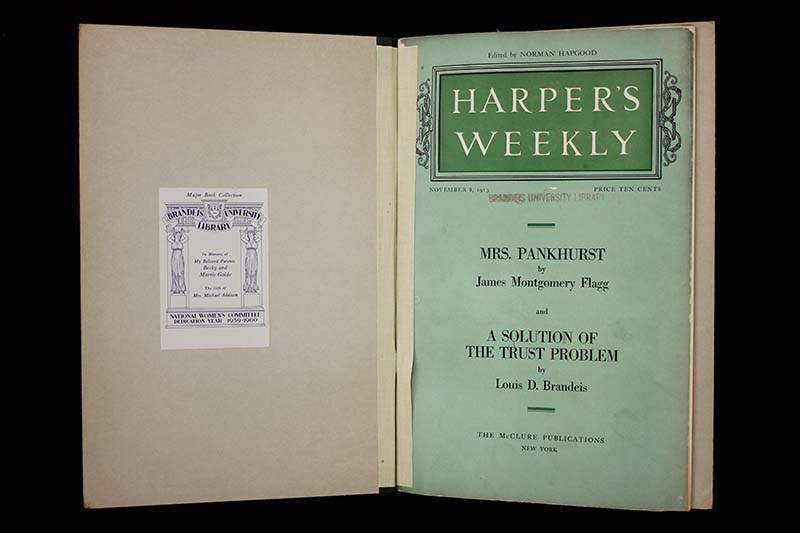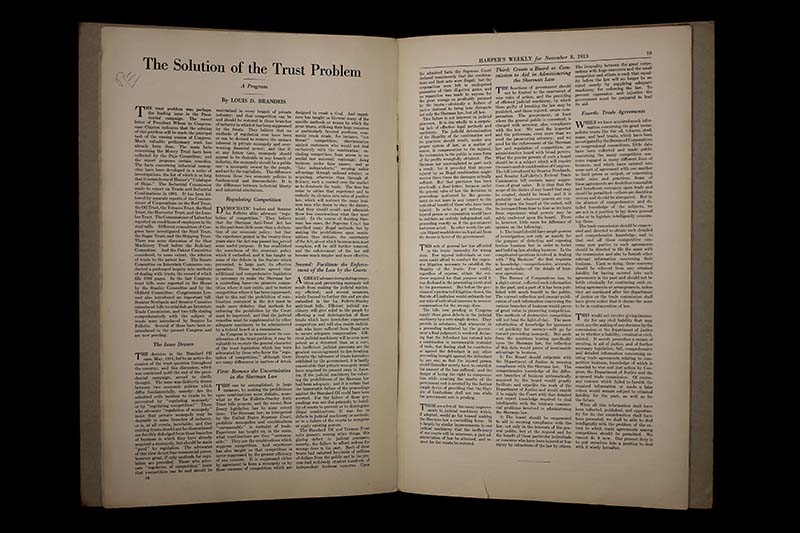“A Solution of the Trust Problem”
by Louis D. Brandeis


Transcript
The Solution of the Trust Problem: A Program
By Louis D. Brandeis
THE trust problem was, perhaps, the leading issue in the Presidential campaign. The recent letter of President Wilson to Congressman Clayton indicates that the solution of this problem will be made the principal task of the coming session of Congress. Much valuable preliminary work has already been done. The main facts concerning the Money Trust have been collected by the Pujo Committee; and the report proposes certain remedies. The facts concerning industrial monopolies have been developed in a series of investigations, the list of which is so long that it reminds one of Homer’s “Catalogue of Ships.” The Industrial Commission made its report on Trusts and Industrial Combinations in 1901. It has been followed by separate reports of the Commissioner of Corporations on the Beef Trust, the Oil Trust, the Tobacco Trust, the Steel Trust, the Harvester Trust, and the Lumber Trust. The Commissioner of Labor has reported on conditions of employees in the steel mills. Different committees of Congress have investigated the Steel Trust, the Sugar Trust, and the Shipping Trust. There was some discussion of the Shoe Machinery Trust before the Judiciary Committee. And the Patent Committee considered, to some extent, the relation of trusts to the patent law. The Senate Committee on Interstate Commerce conducted a prolonged inquiry into methods of dealing with trusts, the record of which fills 2782 pages. In the last Congress, trust bills were reported to the House by the Stanley Committee and by the Oldfield Committee; Congressman Lenroot also introduced bills to establish an Interstate Trade Commission, and two bills dealing comprehensively with the subject of trusts were introduced by Senator La Follette. Several of these have been reintroduced in the present Congress and are now pending.
The Issue Drawn
THE decision in the Standard Oil case, May, 1911, led to an active discussion of the trust question throughout the country; and this discussion, which was continued until the end of the presidential campaign, served to clarify thought. The issue was distinctly drawn between two economic policies which differ fundamentally, namely: Are the admitted evils incident to trusts to be prevented by “regulating monopoly” or by “regulating competition?” Those who advocate “regulation of monopoly” insist that private monopoly may be desirable in some branches of industry, or is, at all events, inevitable; and that existing trusts should not be dismembered nor forcibly dislodged from those branches of business in which they have already acquired a monopoly, but should be made “good” by regulation. The advocates of this view do not fear commercial power, however great, if only methods for regulation are provided. Those who advocate “regulation of competition” insist that competition can be and should be maintained in every branch of private industry; and that competition can be and should be restored in those branches of industry in which it has been suppressed by the trusts. They believe that no methods of regulation ever have been or can be devised to remove the menace inherent in private monopoly and overweening financial power; and that if, at any future time, monopoly should appear to be desirable in any branch of industry, the monopoly should be a public one--a monopoly owned by the people, and not by the capitalists. The difference between these two economic policies is fundamental and irreconcilable. It is the difference between industrial liberty and industrial absolutism.
Regulating Competition
DEMOCRATIC leaders and Senator La Follette alike advocate “regulation of competition.” They believe that the Sherman Anti‑Trust Act has in the past been little more than a declaration of our economic policy; but that the experience gained in the twenty‑three years since the Act was passed has served some useful purpose. It has established the soundness of the economic policy which it embodied, and it has taught us some of the defects in the Statute which prevented, in large part, its effective operation. These leaders agreed that additional and comprehensive legislation is necessary to make the Sherman law a controlling force--to preserve competition where it now exists, and to restore competition where it has been suppressed; that to this end the prohibition of combination contained in the Act must be made more definite; that methods for enforcing the prohibition by the Court must be improved; and that the judicial remedies must be supplemented by other adequate machinery to be administered by a federal board or a commission. As Congress is to resume now its consideration of the trust problem, it may be valuable to re‑state the general character of the trust legislation which has been advocated by those who favor the “regulation of competition,” although there are many differences in matters of detail.
First: Remove the Uncertainties in the Sherman Law
THIS can be accomplished, in large measure, by making the prohibitions upon combinations more definite, somewhat as the La Follette‑Stanley Antitrust bills propose, and the recent New Jersey legislation has to some extent done. The Sherman law, as interpreted by the United States Supreme Court, prohibits monopolies and combinations “unreasonably” in restraint of trade. Experience has taught us, in the main, what combinations are thus “unreasonable.” They are the combinations which suppress competition. And experience has also taught us that competition is never suppressed by the greater efficiency of one concern. It is suppressed either by agreement to form a monopoly or by those excesses of competition which are designed to crush a rival. And experience has taught us likewise many of the specific methods or means by which the great trusts, utilizing their huge resources or particularly favored positions, commonly crush rival; for instance, “cut throat” competition; discrimination against customers who would not deal exclusively with the combination; excluding competitors from access to essential raw material; espionage; doing business under false names; and as “fake independents;” securing unfair advantage through railroad rebates; or acquiring, otherwise than through efficiency, such a control over the market as to dominate the trade. The time has come to utilize that experience and to embody its dictates into rules of positive law, which will instruct the many business men who desire to obey the statute, what they should avoid--and admonish those less conscientious what they must avoid. In the course of deciding Sherman law cases, the Supreme Court has specified many illegal methods, but by making the prohibitions upon combinations thus definite, the uncertainty of the Act, about which business men most complain, will become much simpler and more effective.
Second: Facilitate the Enforcement of the Law by the Courts
A GREAT advance in regulating competition and preventing monopoly will result from making the judicial machinery efficient; and several measures, wisely framed to further this end are also embodied in the La Follette‑Stanley anti‑trust bills. Efficient judicial machinery will give relief to the people by effecting a real disintegration of those trusts which have heretofore suppressed competition and will also enable individuals who have suffered from illegal acts to secure adequate compensation. Efficient judicial machinery will be even more potent as a deterrent than as a cure; for inefficient judicial processes are the greatest encouragement to law‑breaking.
| CREATOR | Louis D. Brandeis |
|---|---|
| DATE | 11/08/2013 |
| FORMAT | Article printed in Harper’s Weekly |
| LANGUAGE | English |
| COLLECTION | Louis Dembitz Brandeis Collection |
| BOX, SERIES | 67, II.I.a.4 |
| RIGHTS | Copyright restrictions may apply. For permission to copy or use this image, contact the Robert D. Farber University Archives & Special Collections Department, Brandeis University Library |